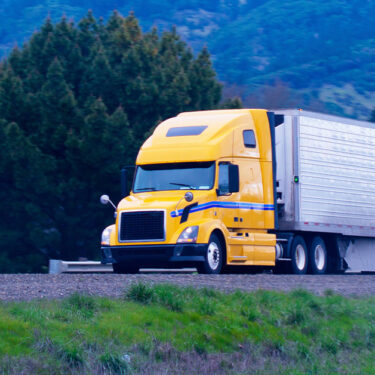About 15,000 pounds of hot dog filler spilled onto the highway near Pittsburgh, Pennsylvania, May 20 when the driver of a semitractor-trailer lost control of the vehicle and crashed onto the shoulder. The tractor-trailer hit several trees and overturned, leaving the driver and a passenger with minor injuries and a portion of Interstate 70 covered in the pink slime. According to authorities, the vehicle’s brakes were found to be “completely inoperable.”
Featured Solutions
“Having tractor-trailers overturn for a variety of different reasons happens frequently,” said William Mills, Director, Transportation, Burns & Wilcox, Salt Lake City, Utah. “It might not necessarily get the headlines that these two did, but the reality is that accidents involving large trucks occur way more often than anybody would like. It is, unfortunately, the nature of the beast.”

Had the spill been something that could cause some ecological damage, there are all kinds of other liabilities that can arise.
The trucking companies involved in these accidents would likely incur a variety of expenses, which could be covered under their Motor Truck Cargo Insurance, Auto Physical Damage Insurance, Truckers Auto Liability Insurance, or other policies. When environmental damage is possible, Transportation Pollution Liability Insurance can also come into play.
“Anytime you have a mysterious fluid entering the ecology of an area, everybody gets up in arms because there could be pollution damage and that could be something a lot more material,” said John McGlynn, Director, Transportation, Burns & Wilcox, Toronto, Ontario. “Had the spill been something that could cause some ecological damage, there are all kinds of other liabilities that can arise.”
Cleanup, lost cargo among possible expenses after tractor-trailer spill
Accidents involving overturned tractor-trailers occur “on a daily basis,” McGlynn said. On May 23, an overturned tractor-trailer in Long Beach, California, spilled 1,000 pounds of hay bales onto the freeway, according to CBS Los Angeles. On April 23, a transport truck rollover in Ottawa, Ontario, spilled hundreds of crates and milk jugs onto the highway and also caused a fuel leak, the Canadian Broadcasting Corporation reported.
“In these cases, there are going to be cleanup costs and a cargo loss,” Mills explained. “A claim can be made against the trucker for the value of the cargo.”
The transportation company’s Motor Truck Cargo Insurance can help with these expenses, while any physical damage to the trailer and tractor could be covered by its Auto Physical Damage Insurance. In accidents where damage is done to a roadway or guardrails, the Department of Transportation could seek reimbursement for repairs, Mills pointed out. This can be covered by the company’s Trucker’s Auto Liability Insurance.

In these cases, there are going to be cleanup costs and a cargo loss. A claim can be made against the trucker for the value of the cargo.
Even minor spills can lead to major expenses when potential environmental hazards are involved, McGlynn said. “Anything can be hazardous; you still have to remediate it,” he said. “It is a matter of how difficult that is, and that drives the cost. Some of these events could be more expensive than maybe meets the eye.”
In January, a $200,000 settlement was reached with a trucking company in California over a 2020 accident that released over 4,500 gallons of oil into the Cuyama River, the Lompoc Record reported. While U.S. companies generally need to carry a separate Transportation Pollution Liability Insurance policy to cover environmental risks, these coverages are often bundled under a single Truckers Auto Liability Insurance policy in Canada, McGlynn noted.
“Depending on the volumes that are spilled, the cleanup can be a very expensive process,” he said. “Large amounts of gasoline or any kinds of hazardous fluid into a sensitive area could create a lot of liabilities for an organization. There can also be other third-party damages that would be very difficult to assess immediately but could emerge and create problems for a firm that may have had negligence or been at-fault for an accident.”
Sufficient liability limits critical for truckers
Larger spills can cause widespread damage, making liability limits on their insurance policies an important factor for trucking companies. “Having sufficient limits is essential,” said McGlynn, emphasizing the increase of nuclear verdicts in the transportation industry. “$1 million is not a lot of money when it comes to any kind of event these days.”
The same principle applies for any accident involving large trucks, including the considerable risk of third-party injuries. In 2020, 4,014 individuals were killed in large truck crashes in the U.S.; of those who died, 15% were truck occupants and 68% were in other vehicles, the Insurance Institute for Highway Safety reported. Longer braking distances, the danger of poorly maintained brakes on slippery roads, and driver fatigue are among the risk factors for large truck crashes, according to the IIHS.

Had the spill been something that could cause some ecological damage, there are all kinds of other liabilities that can arise.
In Ontario, Canada, commercial motor vehicle crash fatalities were up 40% in the first half of 2021 compared to the same time period the previous year, Today’s Trucking reported. Leading risk factors for the increased large-truck crashes included improper lane changes, following too closely, speeding and driver inattention, authorities said.
The risk of a fatal accident is one of many reasons trucking companies may also consider Excess Liability Insurance to provide higher liability limits on top of their standard policies. The need for higher limits continues to be a concern in the transportation industry, Mills said. “Nuclear verdicts continue,” he said.
Costs are also rising across the board, making insurance limits an important discussion that trucking company leaders should have with a specialized insurance broker. “With inflation, which is a big deal, now the cost of everything is higher,” McGlynn said. “The limits that you carry are really being eroded. That is the question that trucking companies need to ask themselves: Are you carrying sufficient limits and are you getting proper advice from a broker?”
Minor injuries resulting from a trucking accident still have the potential for significant medical expenses, Mills said, pointing to the recent accident involving the hot dog filler spill, during which a passenger in the truck was injured. “In a lot of cases, claims resulting from passengers can arise,” he said.
“Most firms will have no-passenger rules,” McGlynn added. “If the driver operates his own company, he can do what he wants, but he has an additional liability in the event that a passenger is injured in an at-fault event. That creates yet another auto liability exposure because if he is at fault, there could be a bodily injury claim.”
Transportation companies face rising insurance premiums, driver shortage
Other challenges facing the transportation industry today include increased insurance premiums and rising fuel costs. In a recent report from the American Transportation Research Institute, insurance premium costs per mile increased overall by 47% over the past 10 years, Heavy Duty Trucking reported in February. High gas prices have even led some truckers to stop driving, worsening the current truck driver shortage, Fox 2 Detroit reported on June 6. Similar conditions are being reported in Canada, with gas prices “crippling” the trucking industry in British Columbia, Canada, North Shore News reported on June 9.
“The continuation of increased premiums and fuel costs have become significant,” Mills said. “The smaller trucking operations, in particular, are having their profit margins squeezed to almost nothing, which is causing a burden and has the potential to have a number of those operations shut down. The economy certainly could have a pronounced effect on transportation.”

There are a lot of things changing in this environment and you have to be aware of that and not become complacent.
Safety should remain a priority during these challenging times, Mills said. Transportation companies can take steps to reduce the risk of a loss, such as keeping their vehicles well-maintained, using careful hiring processes, and offering driver training programs. Risk managers also play an important role in helping companies avoid accidents.
“Do not look at safety as something that can be a shortcut in order to help reduce costs. In the long run, that just does not work out well,” Mills said. “There are a lot of things changing in this environment and you have to be aware of that and not become complacent. You may have to make adjustments to your insurance, and you have to make sure you are talking with your broker about changes that are going on in the marketplace and in your company. Try to look ahead.”
Of course, accidents can still occur, which is why insurance is so important, McGlynn said. “You can do all the right things, and something just goes wrong,” he said.




